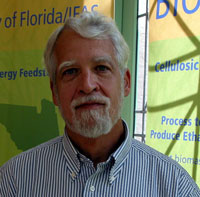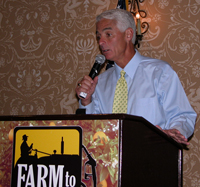 There was reason for a cellulosic ethanol celebration at the second annual Farm to Fuel Summit held in St. Petersburg last week.
There was reason for a cellulosic ethanol celebration at the second annual Farm to Fuel Summit held in St. Petersburg last week.
In this photo released from the University of Florida’s Institute of Food and Agricultural Sciences, UF Senior Vice President for Agriculture and Natural Resources Jimmy Cheek (left), UF Distinguished Professor of Microbiology Lonnie Ingram (center) and Verenium Vice President for Business Development Tim Eves (right) raise a toast to celebrate the first payment from Verenium to UF for use of cellulosic ethanol technology developed by Ingram. (AP photo/University of Florida/IFAS/Thomas Wright)
 The check, representing the beginning of profitability of this technology, was presented at the second annual Farm to Fuel Summit.
The check, representing the beginning of profitability of this technology, was presented at the second annual Farm to Fuel Summit.
Verenium Corporation, a leading developer of biofuels derived from low-cost, abundant biomass and a developer of specialty enzyme products, presented the University of Florida a $66,000 royalty check for its patented cellulosic ethanol technology.
BioEthanol Japan — a joint venture of Marubeni Corp. and Tsukishima Kikai Co., LTD — is using the technology under license from Verenium in their 1.4 million liter-per-year cellulosic ethanol plant in Osaka, Japan. It is the world’s first commercial plant to produce cellulosic ethanol from wood construction waste.
 DomesticFuel did a story and telephone interview with Dr. Ingram in April 2006, so it was a pleasure to meet him at Farm to Fuel to do a follow-up. He has been working on production of cellulosic ethanol for about 20 years. “The breakthroughs we have had in the past year are successes in scaling this up and actually having the first commercial plant operational,” said Ingram. He says it is fully commercialized at this point, with that first royalty check being paid by Verenium, and a small plant in Japan is converting wood waste to ethanol. “The first wood-to-ethanol plant in the world,” says Ingram.
DomesticFuel did a story and telephone interview with Dr. Ingram in April 2006, so it was a pleasure to meet him at Farm to Fuel to do a follow-up. He has been working on production of cellulosic ethanol for about 20 years. “The breakthroughs we have had in the past year are successes in scaling this up and actually having the first commercial plant operational,” said Ingram. He says it is fully commercialized at this point, with that first royalty check being paid by Verenium, and a small plant in Japan is converting wood waste to ethanol. “The first wood-to-ethanol plant in the world,” says Ingram.
As for the big question, how long before cellulosic ethanol production will really be commercially viable, Ingram avoids a direct answer, but notes that there is another demonstration plant being built in Jennings, Louisiana using sugarcane bagasse. “In addition, the University of Florida has received a grant to set up a research demonstration plant in Florida to specifically address Florida biomass sources.”
He believes the potential is there for “Florida to produce all of its automotive fuel needs as ethanol from renewable biomass. There’s also a potential that Florida could produce much of its power from biomass.”
Listen to the 5:00 interview with Dr. Ingram here: [audio:http://www.zimmcomm.biz/audio/f2f-ingraham.mp3]
 Ryan Hunter-Reay said he would be happy if his first IndyCar Series race ended with a “top 6 or 7” finish and he got his wish. He finished seventh, overcoming some mechanical problems in practice.
Ryan Hunter-Reay said he would be happy if his first IndyCar Series race ended with a “top 6 or 7” finish and he got his wish. He finished seventh, overcoming some mechanical problems in practice.

 There was reason for a cellulosic ethanol celebration at the second annual Farm to Fuel Summit held in St. Petersburg last week.
There was reason for a cellulosic ethanol celebration at the second annual Farm to Fuel Summit held in St. Petersburg last week. The check, representing the beginning of profitability of this technology, was presented at the second annual Farm to Fuel Summit.
The check, representing the beginning of profitability of this technology, was presented at the second annual Farm to Fuel Summit. DomesticFuel did a
DomesticFuel did a  Now former Team Ethanol car driver Jeff Simmons
Now former Team Ethanol car driver Jeff Simmons  The
The  Republican presidential candidate Rudy Giuliani says he can lead America to energy independence, and of course, tells Iowans during a campaign stop in the Hawkeye State that ethanol is one of the keys.
Republican presidential candidate Rudy Giuliani says he can lead America to energy independence, and of course, tells Iowans during a campaign stop in the Hawkeye State that ethanol is one of the keys. Green Power Generators is helping the entertainment industry lessen its carbon footprint. GPG is already known for its biodiesel-fueled power generators. According to
Green Power Generators is helping the entertainment industry lessen its carbon footprint. GPG is already known for its biodiesel-fueled power generators. According to  Daniel Oh, the CEO of Renewable Energy Group, will chair the new board.
Daniel Oh, the CEO of Renewable Energy Group, will chair the new board.  Government and industry leaders addressed a sold-out crowd at the second annual
Government and industry leaders addressed a sold-out crowd at the second annual  Rahal Letterman Racing announced today that Ryan Hunter-Reay will be taking over driving duties with the team’s #17 Team Ethanol car effective immediately. I look forward to meeting him soon and I’m sad to see Jeff Simmons replaced. As Bobby Rahal explains in the announcement which I’ve posted below, Jeff stepped into a difficult situation last season. I think Jeff is a class act and was doing a great job as a spokesperson for the team and Team Ethanol. We’ll miss him and wish him and his fiance, Stephanie, all the best.
Rahal Letterman Racing announced today that Ryan Hunter-Reay will be taking over driving duties with the team’s #17 Team Ethanol car effective immediately. I look forward to meeting him soon and I’m sad to see Jeff Simmons replaced. As Bobby Rahal explains in the announcement which I’ve posted below, Jeff stepped into a difficult situation last season. I think Jeff is a class act and was doing a great job as a spokesperson for the team and Team Ethanol. We’ll miss him and wish him and his fiance, Stephanie, all the best. A new USDA report says that about half of the cattle and hog operations in a 12-state Midwest region either fed ethanol co-products or considered feeding them to their livestock last year.
A new USDA report says that about half of the cattle and hog operations in a 12-state Midwest region either fed ethanol co-products or considered feeding them to their livestock last year.